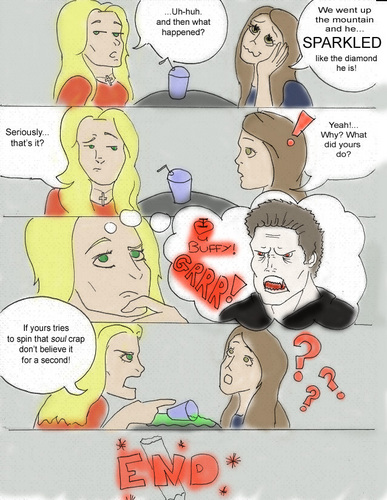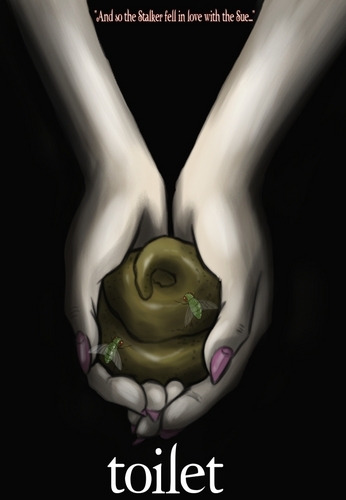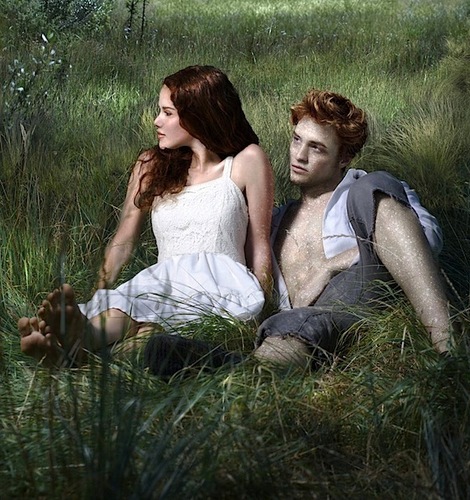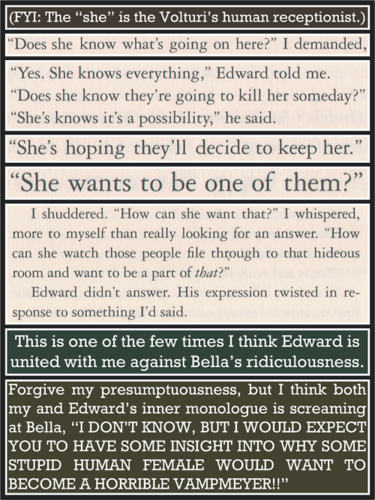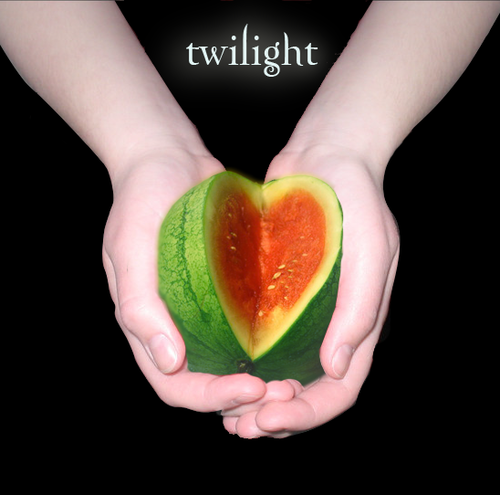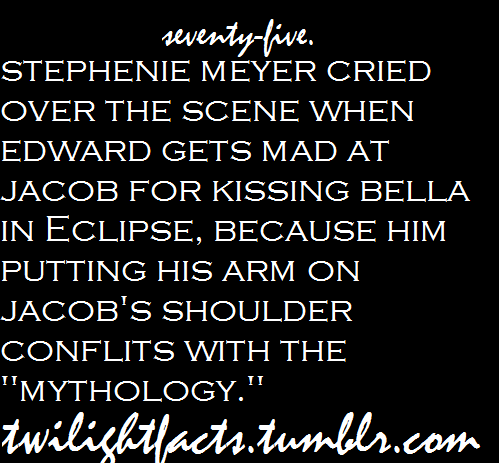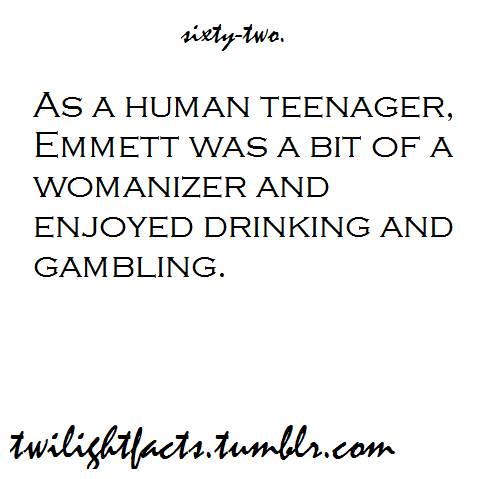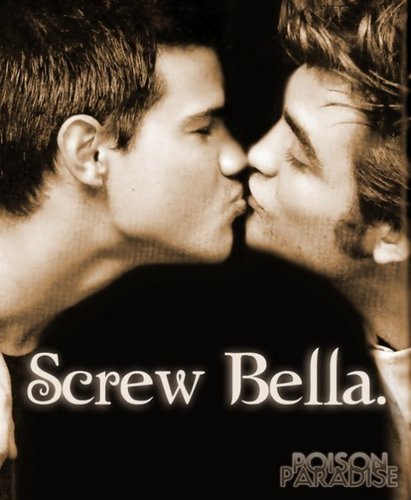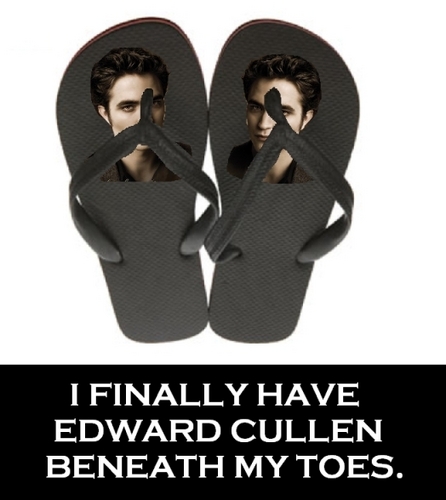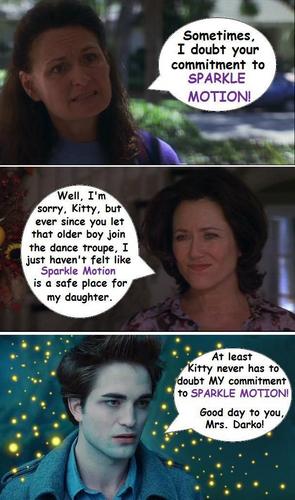Analyzing the Twilight Phenomena
First off, I’d like to mention that I am not a psychologist. Everything you read is just my own analyzing and since I am interested in Psychology and Behaviorism I decided to make an artikulo of what I think is the basic reason for Twilight’s enormous popularity. I hope you will enjoy it.
Recently I came across a post at the Forums that sinabi about Twilight: ” [it’s] a bit childish to say its a failure, because if it is, then why do so many people (And not just crazy teenage girls either) pag-ibig Twilight huh?”.
I have seen this argument countless of times before, and remember being shut up sa pamamagitan ng it seven years nakaraan when I was debating over the meaninglessness of World of Warcraft with my brother. I think his exact words were: “It has millions of fans around the world, how could they all be wrong?”
How indeed? Let’s leave WoW alone and start sa pamamagitan ng analyzing what the Twilight phenomena is for a bit. We know that it has millions of fans, and most of them, or at least a very large part of them, are girls in their teens (although I could be wrong since I have yet to come across any statistics). Its fanbase is also known for being very obsessed with the series, even to the point of pagganap violently towards people who don’t share their views. This in itself is not unheard of: I remember that Harry Potter fans were criticized the same way years nakaraan when it first became a big deal, and people who considered it to be nothing but a children’s series got into heated arguments with fans who insisted upon its literary value. There was also the problem of several schools trying to ban the books on grounds of being Satanic, which led to the fierce defending of Harry Potter’s general themes. I don’t know if this has actually resulted in violence or not, but I wouldn’t be surprised if it had.
We also know that Twilight became a success very quickly, sprouting pelikula and merchandise in just a couple of years after it was published and became a New York Times bestseller. Needless to say, after that its success was guaranteed: madami and madami people became curious to see what all the hype was about and purchased the books. Because of the explosive success Twilight became a very commercial brand, and even now it’s hard to avoid coming across Cullen crests, Twilight towels and even Twilight toilet paper. (And yes, Twilight toilet paper does exist, probably to the delight of many Antis.)
But why does it appeal so deeply to teenagers and even older readers?
First of all, the main characters are teenagers, which makes it easily relatable for those who are still in their teens. And naturally everyone older than that has been a teenager once, and perhaps it makes them nostalgic about the awkward years they survived through. As most might know, there’s also a well-known tagahanga group called “Twi-moms” who are obsessed over the series and are often ridiculed for their seemingly incomprehensible fanatism over a piece of teenage fiction. But is it really so bizarre?
Here’s what Wikipedia says about the subject of “Escapist fiction”: “Escapist fiction is fiction which provides a psychological escape from thoughts of everyday life sa pamamagitan ng immersing the reader in exotic situations or activities.”
Perhaps Bella’s situation is relatable to mature women in madami ways than people think. For an 18-year-old girl she spends a lot of time pondering about getting older which might appeal to middle-aged women and teenagers alike. Throughout the series Bella has a good excuse to not make any major decisions about things because the other characters (such as the Cullens and the werewolves) are in possession of superior knowledge and power. She is also offered the undivided attention of several idealized men without her needing to do much to earn it.
Is it really so bizarre that a middle-aged Twilight-fan who spends most of her time taking care of everyday things such as work, childcare and taking care of her tahanan would fall in pag-ibig with the idea of being offered eternal youth, being the center of a man’s attention and not having to take responsibility for anything for a change?
I think in many ways the phenomena is madami understandable when it comes to older women than young; it offers them an escape from the mundane worries of life. Stephenie Meyer has also stated that she originally wrote the books for herself only, and I think that shines through the writing, as many of the books’ themes revolve around aging, the desire and need to have children, getting attention and preserving your youthful beauty. These themes are not quite usual in teenage literature, as many teenagers take their youth and attention for granted, but very common in literature directed to older readers.
But how can the same book be so popular among teenage girls, then? I think the reasons are different. Many teenage girls are insecure about their looks and inexperienced with boys. There’s rivalry between even mga kaibigan about who’s madami popular and this in turn fuels the feelings of inadequacy.
What Twilight is offering is the chance to land the hottest, richest, maturest and bestest guy in the entire world. And the catch is that in order to land him, you don’t need to change who you are. He doesn’t judge you. He thinks you’re beautiful even if you don’t. He devotes himself to you entirely without paying attention to other girls, even if they are prettier than you. He is better than everybody else in everything, even better than you - but you don’t need to feel threatened sa pamamagitan ng his skills because the reason for his being better is external and has nothing to do with *your* personal skills. You have a good excuse to accept diamonds, cars and other benefits from him without seeming shallow, because he insists you accept them against your will and because he thinks you’re the most selfless person there ever was even if you do accept them.
Teenagers, who are generally inexperienced in love, also tend to idolize the opposite sex. A teenage girl might think that boys are madami experienced and intriguing because they’re pagganap a certain way in order to cover their own insecurity. Teenage boys might think that girls are madami experienced and masterful at toying with them, because that’s the cover girls put up in order to hide their insecurity. Later in life you will laugh at both your own actions and the actions of that once-so-gorgeous member of the opposite sex, but when you’re young you can’t analyze the situation as easily.
Therefore it’s understandable that teenage girls can relate to Bella’s worship of Edward and even Jacob. In the books Jacob doesn’t give up on Bella even though she rejects him, and acts very aloof about the whole thing. However, we are talking about a guy who’s sixteen/seventeen, has never had a girlfriend and as far as we know no experience with girls whatsoever – his unattached behavior as well as his straight-forward and self-assured physical advances would be very unlikely in real life.
I think his character reflects the image teenage girls have of boys their own age: that they are somehow madami secure with themselves than they themselves are. Both Edward and Jacob’s self-assured behavior also saves Bella the trouble of taking the first steps in their relationship which, to a young girl, would be a very intimidating thing, and also something she might automatically expect guys to take care of.
To get back to the subject of “how can millions of fans be wrong?”, I have the following to say: just because something is popular does not mean it necessarily has any literary, cultural, political, social or other meaningful value. A book or a movie can be popular among people without filling any of this criteria. That’s because of a phenomena called “the Bandwagon effect.” Wikipedia has this to say about the Bandwagon Effect:
“The bandwagon effect is well-documented in behavioral science and has many applications. The general rule is that conduct or beliefs spread among people, as fads and trends clearly do, with "the probability of any individual adopting it increasing with the proportion who have already done so". As madami people come to believe in something, others also "hop on the bandwagon" regardless of the underlying evidence. The tendency to follow the actions or beliefs of others can occur because individuals directly prefer to conform, or because individuals derive information from others.”
Bandwagon effect is the best friend of any commercial designer: sa pamamagitan ng advertising a product they are in fact planting the image that “everybody has/needs this product” into the consumers head. When the consumer becomes convinced enough that this is true, they hop on to the “bandwagon” and buy the product. Scientifically speaking, this behavior makes sense as a person will only live for so and so long, and therefore needs to be able to derive information from others because they simply won’t live long enough to learn everything sa pamamagitan ng personal experience. Adaptation to your cultural and social surroundings also gives you an advantage in surviving and ensures good chances at natural selection.
As I already mentioned, the Twilight series is a very commercial trademark. Since it’s everywhere, even those who would otherwise feel no interest toward the series might read it and like it because “everybody else does and millions of fans must be right.” Especially teenagers might not be as experienced in media criticism to notice many of the things some antis don’t like about the Twilight series, and even if they do they don’t need to care about the criticism unless it comes from their own group of friends, since they are the ones they identify with. That’s because the Bandwagon effect is related to the Herd instinct, meaning that you will madami likely follow your own “herd” than any other.
You might also change your opinion because you’re influenced sa pamamagitan ng an Authority. An Authority is somebody who you idolize and look up to, even madami than your own herd. For example, a Twilight tagahanga with a crush on Robert Pattinson might change her mind after pagbaba about Robert Pattinson’s negative opinion of the Twilight series. Since Robert Pattinson has begun to symbolize their fandom, his authority overrides her herd’s authority. The tagahanga might continue being a tagahanga of Pattison’s, but abandon their original fandom.
This is naturally a two-way street. People might like Twilight because everybody else does, but people can also hate it because everyone else does. And sa pamamagitan ng “everybody else” I mean your own herd, the people around you who influence you and your decisions. Also antis have Authorities that they follow, be it an influential friend/member of the family or an idol: for example a person could be a rabid tagahanga of Robert Pattinson and get a negative image of the Twilight series without pagbaba it because of his comments. Or a person could look up to their older sister and be influenced sa pamamagitan ng her opinion of the Twilight series. Even if the person would later read the series, the negative image they already have will affect how they analyze what they read.
All this doesn’t mean that people should feel bad about liking Twilight. Just as something can be popular without having much value, people don’t *need* to like things because they have value, but because they are entertaining or make you feel good. What you like is a matter of personal choice and can’t be argued with. Also, having mutual interests as your mga kaibigan have is ultimately a good thing and makes you bond with them. That’s why it doesn’t really matter if you hate Twilight with them or if you pag-ibig it, because the personal satisfaction and bonding experience is just as strong.
I would be interested to hear what you think about my theories. Feel free to add your own opinions!
First off, I’d like to mention that I am not a psychologist. Everything you read is just my own analyzing and since I am interested in Psychology and Behaviorism I decided to make an artikulo of what I think is the basic reason for Twilight’s enormous popularity. I hope you will enjoy it.
Recently I came across a post at the Forums that sinabi about Twilight: ” [it’s] a bit childish to say its a failure, because if it is, then why do so many people (And not just crazy teenage girls either) pag-ibig Twilight huh?”.
I have seen this argument countless of times before, and remember being shut up sa pamamagitan ng it seven years nakaraan when I was debating over the meaninglessness of World of Warcraft with my brother. I think his exact words were: “It has millions of fans around the world, how could they all be wrong?”
How indeed? Let’s leave WoW alone and start sa pamamagitan ng analyzing what the Twilight phenomena is for a bit. We know that it has millions of fans, and most of them, or at least a very large part of them, are girls in their teens (although I could be wrong since I have yet to come across any statistics). Its fanbase is also known for being very obsessed with the series, even to the point of pagganap violently towards people who don’t share their views. This in itself is not unheard of: I remember that Harry Potter fans were criticized the same way years nakaraan when it first became a big deal, and people who considered it to be nothing but a children’s series got into heated arguments with fans who insisted upon its literary value. There was also the problem of several schools trying to ban the books on grounds of being Satanic, which led to the fierce defending of Harry Potter’s general themes. I don’t know if this has actually resulted in violence or not, but I wouldn’t be surprised if it had.
We also know that Twilight became a success very quickly, sprouting pelikula and merchandise in just a couple of years after it was published and became a New York Times bestseller. Needless to say, after that its success was guaranteed: madami and madami people became curious to see what all the hype was about and purchased the books. Because of the explosive success Twilight became a very commercial brand, and even now it’s hard to avoid coming across Cullen crests, Twilight towels and even Twilight toilet paper. (And yes, Twilight toilet paper does exist, probably to the delight of many Antis.)
But why does it appeal so deeply to teenagers and even older readers?
First of all, the main characters are teenagers, which makes it easily relatable for those who are still in their teens. And naturally everyone older than that has been a teenager once, and perhaps it makes them nostalgic about the awkward years they survived through. As most might know, there’s also a well-known tagahanga group called “Twi-moms” who are obsessed over the series and are often ridiculed for their seemingly incomprehensible fanatism over a piece of teenage fiction. But is it really so bizarre?
Here’s what Wikipedia says about the subject of “Escapist fiction”: “Escapist fiction is fiction which provides a psychological escape from thoughts of everyday life sa pamamagitan ng immersing the reader in exotic situations or activities.”
Perhaps Bella’s situation is relatable to mature women in madami ways than people think. For an 18-year-old girl she spends a lot of time pondering about getting older which might appeal to middle-aged women and teenagers alike. Throughout the series Bella has a good excuse to not make any major decisions about things because the other characters (such as the Cullens and the werewolves) are in possession of superior knowledge and power. She is also offered the undivided attention of several idealized men without her needing to do much to earn it.
Is it really so bizarre that a middle-aged Twilight-fan who spends most of her time taking care of everyday things such as work, childcare and taking care of her tahanan would fall in pag-ibig with the idea of being offered eternal youth, being the center of a man’s attention and not having to take responsibility for anything for a change?
I think in many ways the phenomena is madami understandable when it comes to older women than young; it offers them an escape from the mundane worries of life. Stephenie Meyer has also stated that she originally wrote the books for herself only, and I think that shines through the writing, as many of the books’ themes revolve around aging, the desire and need to have children, getting attention and preserving your youthful beauty. These themes are not quite usual in teenage literature, as many teenagers take their youth and attention for granted, but very common in literature directed to older readers.
But how can the same book be so popular among teenage girls, then? I think the reasons are different. Many teenage girls are insecure about their looks and inexperienced with boys. There’s rivalry between even mga kaibigan about who’s madami popular and this in turn fuels the feelings of inadequacy.
What Twilight is offering is the chance to land the hottest, richest, maturest and bestest guy in the entire world. And the catch is that in order to land him, you don’t need to change who you are. He doesn’t judge you. He thinks you’re beautiful even if you don’t. He devotes himself to you entirely without paying attention to other girls, even if they are prettier than you. He is better than everybody else in everything, even better than you - but you don’t need to feel threatened sa pamamagitan ng his skills because the reason for his being better is external and has nothing to do with *your* personal skills. You have a good excuse to accept diamonds, cars and other benefits from him without seeming shallow, because he insists you accept them against your will and because he thinks you’re the most selfless person there ever was even if you do accept them.
Teenagers, who are generally inexperienced in love, also tend to idolize the opposite sex. A teenage girl might think that boys are madami experienced and intriguing because they’re pagganap a certain way in order to cover their own insecurity. Teenage boys might think that girls are madami experienced and masterful at toying with them, because that’s the cover girls put up in order to hide their insecurity. Later in life you will laugh at both your own actions and the actions of that once-so-gorgeous member of the opposite sex, but when you’re young you can’t analyze the situation as easily.
Therefore it’s understandable that teenage girls can relate to Bella’s worship of Edward and even Jacob. In the books Jacob doesn’t give up on Bella even though she rejects him, and acts very aloof about the whole thing. However, we are talking about a guy who’s sixteen/seventeen, has never had a girlfriend and as far as we know no experience with girls whatsoever – his unattached behavior as well as his straight-forward and self-assured physical advances would be very unlikely in real life.
I think his character reflects the image teenage girls have of boys their own age: that they are somehow madami secure with themselves than they themselves are. Both Edward and Jacob’s self-assured behavior also saves Bella the trouble of taking the first steps in their relationship which, to a young girl, would be a very intimidating thing, and also something she might automatically expect guys to take care of.
To get back to the subject of “how can millions of fans be wrong?”, I have the following to say: just because something is popular does not mean it necessarily has any literary, cultural, political, social or other meaningful value. A book or a movie can be popular among people without filling any of this criteria. That’s because of a phenomena called “the Bandwagon effect.” Wikipedia has this to say about the Bandwagon Effect:
“The bandwagon effect is well-documented in behavioral science and has many applications. The general rule is that conduct or beliefs spread among people, as fads and trends clearly do, with "the probability of any individual adopting it increasing with the proportion who have already done so". As madami people come to believe in something, others also "hop on the bandwagon" regardless of the underlying evidence. The tendency to follow the actions or beliefs of others can occur because individuals directly prefer to conform, or because individuals derive information from others.”
Bandwagon effect is the best friend of any commercial designer: sa pamamagitan ng advertising a product they are in fact planting the image that “everybody has/needs this product” into the consumers head. When the consumer becomes convinced enough that this is true, they hop on to the “bandwagon” and buy the product. Scientifically speaking, this behavior makes sense as a person will only live for so and so long, and therefore needs to be able to derive information from others because they simply won’t live long enough to learn everything sa pamamagitan ng personal experience. Adaptation to your cultural and social surroundings also gives you an advantage in surviving and ensures good chances at natural selection.
As I already mentioned, the Twilight series is a very commercial trademark. Since it’s everywhere, even those who would otherwise feel no interest toward the series might read it and like it because “everybody else does and millions of fans must be right.” Especially teenagers might not be as experienced in media criticism to notice many of the things some antis don’t like about the Twilight series, and even if they do they don’t need to care about the criticism unless it comes from their own group of friends, since they are the ones they identify with. That’s because the Bandwagon effect is related to the Herd instinct, meaning that you will madami likely follow your own “herd” than any other.
You might also change your opinion because you’re influenced sa pamamagitan ng an Authority. An Authority is somebody who you idolize and look up to, even madami than your own herd. For example, a Twilight tagahanga with a crush on Robert Pattinson might change her mind after pagbaba about Robert Pattinson’s negative opinion of the Twilight series. Since Robert Pattinson has begun to symbolize their fandom, his authority overrides her herd’s authority. The tagahanga might continue being a tagahanga of Pattison’s, but abandon their original fandom.
This is naturally a two-way street. People might like Twilight because everybody else does, but people can also hate it because everyone else does. And sa pamamagitan ng “everybody else” I mean your own herd, the people around you who influence you and your decisions. Also antis have Authorities that they follow, be it an influential friend/member of the family or an idol: for example a person could be a rabid tagahanga of Robert Pattinson and get a negative image of the Twilight series without pagbaba it because of his comments. Or a person could look up to their older sister and be influenced sa pamamagitan ng her opinion of the Twilight series. Even if the person would later read the series, the negative image they already have will affect how they analyze what they read.
All this doesn’t mean that people should feel bad about liking Twilight. Just as something can be popular without having much value, people don’t *need* to like things because they have value, but because they are entertaining or make you feel good. What you like is a matter of personal choice and can’t be argued with. Also, having mutual interests as your mga kaibigan have is ultimately a good thing and makes you bond with them. That’s why it doesn’t really matter if you hate Twilight with them or if you pag-ibig it, because the personal satisfaction and bonding experience is just as strong.
I would be interested to hear what you think about my theories. Feel free to add your own opinions!


